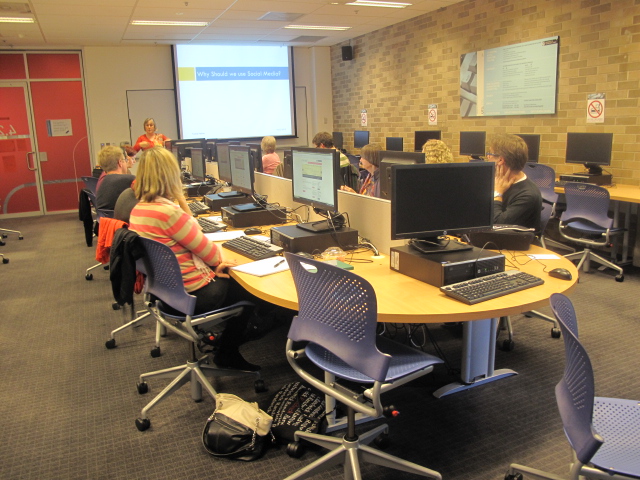Mark Dunn reports on the PHA NSW CPD event for May, Social Media for the Cautious Historian, conducted by Yvonne Perkins. This was a welcome, hand-holding guide through the world of social media and what it offers to historians, many of whom have been a bit slow on the uptake of these new means of communication. Consequently we have missed the advantages and opportunities that sites, such as Facebook, Twitter, Linked-in and WordPress can offer.
A quick survey of the twelve attendees found that while about half the room was using social media in some format, no-one was overly confident they were utilising it to its full capacity. For the rest of us who weren’t on it at all, it was a case of feeling it had passed us by or wasn’t particularly relevant.
So why should historians be on social media? Isn’t it mainly for footballers to keep us up-to -date about their latest indiscretion or for teenagers to post things they will later regret?
No it’s not (as it turns out).
Social media gives us, as historians, the opportunity to connect to a new and ever-growing audience, locally, nationally and internationally. Historians are communicators and educators; we want to tell other people about our research and publicise our work and the work of our compatriots.
With this in mind, social media is now an essential tool in the communication process and a space where more historians’ voices are needed.
Of course the PHA NSW has been on board for a little while now with the PHA blog and the members’ profile sections of the website. So this is where we started. First was an opportunity for people in the room to update their profile. The website is for many, the first point of contact with us as historians so a snappy profile is professionally a good idea. If you are reading this and haven’t updated your profile through the members section of the website, get cracking!
The second session was devoted to Twitter and Facebook. Yvonne talked us through the Twittersphere and its great strengths for historians as an international web of contacts and information.
Twitter is all about the conversation. For historians this can be fantastic and with a growing number of historians in Australia and overseas getting on Twitter, the conversation gets more interesting.
There are some things to be wary of. Twitter is about support and generous acknowledgement of other people’s information and talents, so best not to talk about yourself too much, or go on about your Sunday café brunch, or get involved in tit-for-tat arguments, at least not if you are wanting to use it for professional purposes.
Workshop participants set up Twitter accounts left right and centre and tweets were flying by 3pm!
Sadly, so engrossed had we become that we ran out of time for Facebook . Never mind, we can organise another CPD to cover that later.
For those keen to explore, Yvonne has put a series of instructions, Twitter links, Facebooking historians and bloggers on the PHA website in the members section. Go to http://www.phansw.org.au/members-section/cpd-18th-may/
Thanks to Yvonne and Laila for organising the event and Paul Ashton for getting us the computer lab at UTS.

Thanks Mark for this report, I’m sorry I missed what looks like a really useful and informative session! And thanks Yvonne for publishing those instructions.
I have to admit while I’m an avid facebooker I’ve avoided twitter as an unnecessary distraction/source of procrastination. However I noticed this morning the twitter guide for the forthcoming AHA (http://www.ahaconference.com.au/?pgid=341) and started to rethink the value of becoming a twitterstorian… then I was instantly put off by the foreign language of the tweets from last year’s AHA.
So to the PHA’s twitterstorians – do the benefits of engaging with the history sector through twitter outweigh the risks for a self-declared farnarkler? And won’t engagement via handheld mobile devices detract from the face to face engagement conferences deliver? (ie listening and talking to people?!)
Looking forward to hearing people’s thoughts! I promise to go with majority consensus at the AHA (maybe)
I’m glad you found the instructions useful Caroline!
Last year I tweeted and blogged the Australian Historical Association Conference in Adelaide (you can read my posts here). I have found twitter invaluable for putting me in touch with people and historical resources I would never have known otherwise.
In a conference session many people take notes. Tweeps go one step further – they share their notes as they are writing them with the world. People who cannot attend the conference can then ‘listen in’ and participate in conference discussions. This is a boon to historians in more remote parts of the world like Australia as we can share the work we do with others much easier. American and English historians were following the Australian conference through twitter last year.
Likewise we can listen in to conferences that we cannot attend. This post
which I wrote about following the American Historical Association conference last year addresses many of the questions you have. The conversation at the conference continued through twitter, into this post and the comments. The post was then tweeted, not only by historians, but by researchers in public health and education around the world.
Thanks for your questions Caroline. If you do decide to join twitter, make sure you follow PHA NSW – @pha_nsw.